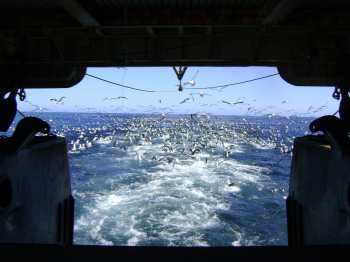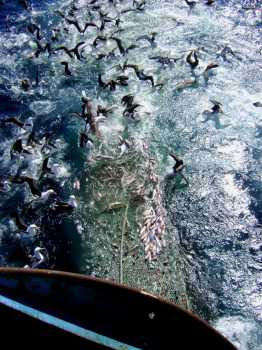José Granadeiro of the Museu Nacional de História Natural, Universidade de Lisboa, Portugal and colleagues have published on-line in the open-access journal PloS ONE a study that uses high-resolution tracking data from both birds and vessels to provide a comprehensive picture of the nature and extent of fisheries interactions with the Black-browed Albatross Thalassarche melanophris.
The paper's abstract follows:
"Fisheries have major impacts on seabirds, both by changing food availability and by causing direct mortality of birds during trawling and longline setting. However, little is known about the nature and the spatial-temporal extent of the interactions between individual birds and vessels. By studying a system in which we had fine-scale data on bird movements and activity, and near real-time information on vessel distribution, we provide new insights on the association of a threatened albatross with fisheries. During early chick-rearing, black-browed albatrosses Thalassarche melanophris from two different colonies (separated by only 75 km) showed significant differences in the degree of association with fisheries, despite being nearly equidistant to the Falklands fishing fleet. Most foraging trips from either colony did not bring tracked individuals close to vessels, and proportionally little time and foraging effort was spent near ships. Nevertheless, a few individuals repeatedly visited fishing vessels, which may indicate they specialise on fisheries-linked food sources and so are potentially more vulnerable to bycatch. The evidence suggests that this population has little reliance on fisheries discards at a critical stage of its nesting cycle, and hence measures to limit fisheries waste on the Patagonian shelf that also reduce vessel attractiveness and the risk of incidental mortality, would be of high overall conservation benefit."


Reference:
Granadeiro, J.P., Phillips, R.A., Brickle, P. & Catry, P. 2011. Albatrosses following fishing vessels: how badly hooked are they on an easy meal? PLoS ONE 6(3): e17467. doi:10.1371/journal.pone.0017467.
P.S. For those among us who have been wondering what the journal name means: "PLoS ONE is published by the Public Library of Science (PLoS), a nonprofit organization".
John Cooper, ACAP Information Officer, 30 March 2011

 English
English  Français
Français  Español
Español